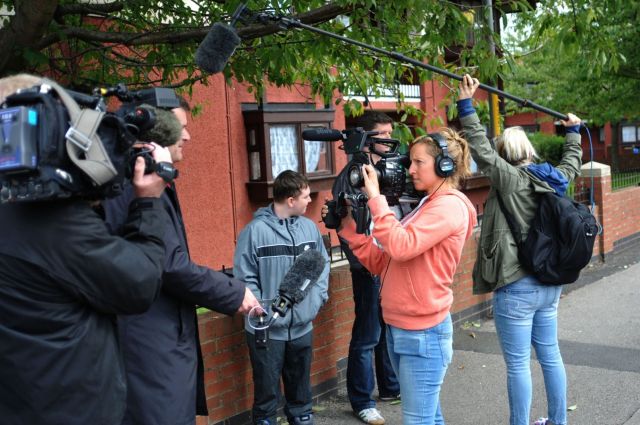
Kingston Road in Stockton-on-Tees. This was the location for the second series of Benefits Street, Channel 4’s controversial reality TV show about some of the poorest people in the country. Claiming to be raising awareness, it was broadcast in 2015 and came under fire for being ‘poverty porn’, exploiting the local residents and making them look feckless and immoral. Originally, I planned to go down and fight against Benefits Street. Clips I’d seen of the show had made me angry. I felt these people were being put across as scum, in a way that seemed to say they would never be interested in something ‘cultural’. So the idea was, by going and writing a poem for them, I’d help prove they weren’t the two dimensional thugs they were made out to be.
But, to be honest, when I sat down to watch the whole of the series, I was surprised. It seemed like, overall, Channel 4 had actually treated the residents with a lot of respect. Yes, shots of people like Maxwell smoking bongs and hanging around in his front garden were clearly put there to make people on benefits look bad (as if no one with a job is a stoner). But the vast majority of the residents are shown to be doing everything they can to get by; we see them in genuine need of help, struggling under a system that’s given up on them. It’s the government’s lack of support which comes out looking the worst.
 At times, it was difficult and emotional to watch. I was really moved by Julie, a single mother who spends every minute of her time caring for her 16-year-old son, Reagan. Reagan has very complicated needs after having a cardiac arrest at 9 months old, which left him with severe brain damage. In the final episode, we see the neighbours all chipping in what little they have to help Julie live her Christmas dream: To ride with her son on a sleigh pulled by a reindeer. Soon after this, we’re told that Reagan has died, after living 16 years longer than the doctors said was ever possible. It’s blatantly obvious why Julie can’t go to work. In a climate where people on benefits are made out to be villains, it struck me that a message like hers was incredibly important to get out. It’s still as important, if not more, 2 years down the line.
At times, it was difficult and emotional to watch. I was really moved by Julie, a single mother who spends every minute of her time caring for her 16-year-old son, Reagan. Reagan has very complicated needs after having a cardiac arrest at 9 months old, which left him with severe brain damage. In the final episode, we see the neighbours all chipping in what little they have to help Julie live her Christmas dream: To ride with her son on a sleigh pulled by a reindeer. Soon after this, we’re told that Reagan has died, after living 16 years longer than the doctors said was ever possible. It’s blatantly obvious why Julie can’t go to work. In a climate where people on benefits are made out to be villains, it struck me that a message like hers was incredibly important to get out. It’s still as important, if not more, 2 years down the line.
This wasn’t so much about proving Channel 4 wrong anymore. Instead, I decided to go down with my eyes open and see what effect the series had had on the area. Whichever way you look at it, Kingston Road had still been advertised as one of the most deprived, run-down places in the country. Now that many people on the street were celebrities, would it still be the same? And would any of them want a poem? On a bright and very cold winter’s day, I got the train to Stockton to see what I could find.
–
Captain’s Log 23/01/17 12:57
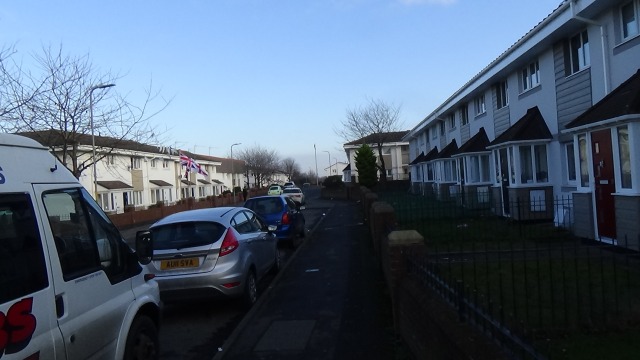
I turn onto a street with no name and walk into the infamous Tilery Estate. I’ve got a map, but I can’t seem to find Kingston Road anywhere. After getting lost for about 20 minutes, I finally spot it. The first thing I notice is the houses. They’re not the dilapidated, red and brown buildings we see in Benefits Street; they’re now the whitest white you can imagine, with double glazing and sleek modern features. They’re so bright they hurt my eyes. In fact, all the buildings round here look like this. In the series, Sue and Julie say they’ve been trying to get the council to deal with their rotten window frames for years. It’s something I can relate to, having grew up in various council houses as a kid. Damp would often get into the old wood and rot the frames away, letting in drafts and generally defeating the whole point of a window. It seems like it must have finally got sorted for them.
 I walk to the top of the road and knock on the first door. No answer. I try a few more, nothing. It’s incredibly quiet. The show makes the place out to be teeming with young people, riding BMXs at all hours of the day and night. It’s definitely not like that. As I’m waiting outside the next place, I swear I catch sight of Julie in the corner of my eye. She walks past me carrying loads of shopping bags, I see her put them down in front of a house to my left. There’s no harm in trying.
I walk to the top of the road and knock on the first door. No answer. I try a few more, nothing. It’s incredibly quiet. The show makes the place out to be teeming with young people, riding BMXs at all hours of the day and night. It’s definitely not like that. As I’m waiting outside the next place, I swear I catch sight of Julie in the corner of my eye. She walks past me carrying loads of shopping bags, I see her put them down in front of a house to my left. There’s no harm in trying.
“Excuse me,” I say, walking over. “I’m doing an art project, have you got a minute?”
“Not really. I’ve got someone coming over to do an interview. What’s it about like?”
“Have you got one minute?” I ask. She says OK. I do my intro poem.*
–
“So how does this work,” Julie says, smiling and looking interested. I explain that we’d have a chat about what’s important to her, then I’d write something and bring it back. “Someone from the BBC is coming over about my charity. We’ve just won the Pride of Britian Award for Fundraiser of the Year.”
“That sounds amazing,” I say. She tells me how, after her son Reagan passed away, she set up Reagan Jack Rainbows to help other parents caring for children with complicated health conditions. I offer to write a poem about it.
“That would be great.”
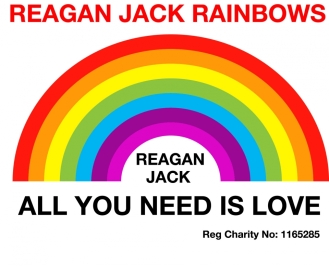 Julie explains a bit more about what they do. “We help bridge the gap that the NHS doesn’t fill. It’s a pretty big gap.” She talks about the equipment the charity offers, which seems to range massively depending on each individual they help. “We provide something called the second skin. A little boy we know has got severe cerebral palsy and his organs are getting crushed, this second skin stops the progression of his spine twisting.” They’ve helped raise money for all kinds of children: An ipad for a little girl called Melodie, who has Phelan-McDermid Syndrome and can’t talk; a pulse oxyometer for a baby called Harry; a treatment for a boy called Kian, who has Neuroblastoma. The list goes on and on.
Julie explains a bit more about what they do. “We help bridge the gap that the NHS doesn’t fill. It’s a pretty big gap.” She talks about the equipment the charity offers, which seems to range massively depending on each individual they help. “We provide something called the second skin. A little boy we know has got severe cerebral palsy and his organs are getting crushed, this second skin stops the progression of his spine twisting.” They’ve helped raise money for all kinds of children: An ipad for a little girl called Melodie, who has Phelan-McDermid Syndrome and can’t talk; a pulse oxyometer for a baby called Harry; a treatment for a boy called Kian, who has Neuroblastoma. The list goes on and on.
“We had the whole North Tees Children’s Ward painted in beautiful murals,” says Julie. “That’s where Reagan was when he was really poorly.” I ask her what it’s like for a parent caring for a child with complex needs. “Firstly, this is the best community. Nothing was too much trouble.” But she tells me that it’s still extremely difficult. “I couldn’t get out, Reagan was on my knee. When darkness comes and you’re on your own, that’s when the fear… You know… That they’re lacking oxygen.” Her eyes fill up. “What can I say? You hope each day that God gives you the blessing, that he’s still there.” This feels like an incredibly important message to put in a poem. About the loneliness and worry involved in being a single parent and a carer, but also about her community and about what she’s doing with Reagan Jack Rainbows.
I’ve got to say, I admire Julie. I think the way she’s taken the pain of losing her son and turned it into a force for good is incredible. And, despite what people said about Benefits Street, she used the show as a platform to highlight the problems faced by thousands of parents just like her.
“People called us scroungers,” she says. “There’s no scroungers here. People have their own reasons why they’re unemployed. My reason was that I was taking care of Reagan. Now Reagan’s passed away, I’ve used my time- with the help of all these lot round here by the way- to set up a registered charity helping other kids. Too many people are too quick to judge.” I think the series really got across that message too.
I bring up the fancy houses. Did it have anything to do with being on TV? “Definitely, we’d been knocked back for 3 years before that. The minute it went on the telly, we got the letters about the scaffolding and everything.” It strikes me suddenly that Kingston Road has become an incredibly weird place since Benefits Street was broadcast. As I look around, I can’t help but get the feeling that whoever planned the renovation was trying a bit too hard. It has an artificial quality about it, like a film set, and the decision to wash it white seems almost ironic. Julie’s oldest son comes home and I shake his hand.
“Hi, I’m Rowan. I’m going to write a poem for your mam.” He looks at me the way people usually do… confused. I say my goodbyes.
“I thought you were the TV licence man,” Julie laughs, waving to me as I walk away.
–
 After this, I try all the way down Kingston Road. 3 people come to the door and politely say no, including an old lady who I think I remember from the series. Mainly though, there’s no answer. I get to the bottom of the road and go back up to the top to try the other side. After quite a few doors, I meet Chelsea, who comes out with a long black cardigan on, rubbing a baby bump. She seems to really enjoy the poem. I ask her what’s important.
After this, I try all the way down Kingston Road. 3 people come to the door and politely say no, including an old lady who I think I remember from the series. Mainly though, there’s no answer. I get to the bottom of the road and go back up to the top to try the other side. After quite a few doors, I meet Chelsea, who comes out with a long black cardigan on, rubbing a baby bump. She seems to really enjoy the poem. I ask her what’s important.
“Well, I’m going to have a baby in 7 weeks, so that’s the most important thing to me at the minute. It’s my first, everything’s really new.” She tells me he’s a boy. I ask if there’s a name for him yet, “I’ve thought of a few, but I just went off them.”
I know that being a first time mother can be really confusing. I ask if there’s anything that worries her.
“Being really poorly. I’ve been in and out of hospital so you’re constantly worrying if the baby’s OK.” I immediately regret picking such a stupid question. Of course there’s things that worry her! “Then there’s the labour and stuff,” she adds. “I just found out I’m going to be induced, so I’m starting to panic about that. It’s the unexpected.” I ask if everything’s OK with her health now. “Oh yeah, everything’s fine. I had really bad morning sickness and I couldn’t keep down water. I had to go on a drip.” I’ve never heard of morning sickness being so bad that you need a drip, she tells me it’s really unusual. “I’m diabetic with the baby as well, my Mam’s been coming with me to all my hospital appointments. But it’s worth it to know the baby’s OK and everything’s gonna be fine.”
Chelsea has clearly had a bad time of it with the pregnancy. But, despite this, she seems to be really powering through it. I mention that, on the plus side, this would be useful in an argument with him as a teenager; if he ever won’t tidy his room, for example. ‘I was diabetic because of you!’ Who can argue with that? We laugh, but it makes me think of all the things a mother has to go through before a child even has a name. I suppose I don’t really consider this very often. I just want to say, to all the women out there who are having kids: You’re smashing that whole ‘child having’ thing.
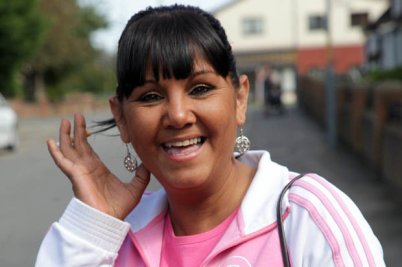 Before I go, I ask if Chelsea knows anyone else on the street who might like a poem.
Before I go, I ask if Chelsea knows anyone else on the street who might like a poem.
“To be honest,” she says, “a lot of people don’t answer the door. They just assume it’s the press.” It seems mad that this can still be effecting the area years after the show was broadcast. But then Julie did say she was meeting someone from the BBC right this minute. And I think about the story The Sun ran on Dot, another resident, while Channel 4 were filming here. Headlined ‘Orange Dot’, it accused her of spending all her benefits on fake tan and sunbeds. In reality, she was mixed race and this was her natural skin colour. After something like that, it seems pretty reasonable that they might be a bit wary of talking to strangers.
“You could try Julie,” says Chelsea. “All the work she does with her charity is great. My cousin’s baby needed this monitor for his sats, otherwise his oxygen levels would be really low, to the point he was nearly dead. The hospital loaned her one, but they told her she could only have it for two weeks. So Julie paid for a machine out of the charity money. It’s saved his life a few times now.” The more I hear about Julie, the more she sounds like a really good egg. I wonder how many people she’s saved on this street? I say my goodbyes to Chelsea and carry on.
 I work my way down the rest of Kingston Road. No one answers. By now I’ve been outside for 2 hours and I’m freezing. It’s 2 degrees and I seriously regret not wearing more layers. There’s an ice cream van parked at the top of the road that’s been driving around for 10 minutes, the music from it echoing through the empty streets in a haunting fashion. Even if there was someone out buying it, who wants ice cream in this weather anyway?! My hands are currently the temperature of ice cream.
I work my way down the rest of Kingston Road. No one answers. By now I’ve been outside for 2 hours and I’m freezing. It’s 2 degrees and I seriously regret not wearing more layers. There’s an ice cream van parked at the top of the road that’s been driving around for 10 minutes, the music from it echoing through the empty streets in a haunting fashion. Even if there was someone out buying it, who wants ice cream in this weather anyway?! My hands are currently the temperature of ice cream.
 I turn right down Carliol Walk, a little cut with houses along one side. A woman is standing outside the first house, she says she’s about to go and pick up the kids. After this, I knock on the whole street and not a single person answers. It’s starting to feel like I’ve not really seen many people in the Tilery Estate at all. I don’t know if they’re inside the houses or not but, from the outside, it gives the whole place the vibe of a ghost town. Next, I go along Tilery Way. No one. Then I go all the way along Talbot Street; a young boy with a really friendly smile says he’s going out; an old man who looks like he has a small piece of cotton wool hanging from one ear says he’s picking up the grandkids. Aside from these two, no one.
I turn right down Carliol Walk, a little cut with houses along one side. A woman is standing outside the first house, she says she’s about to go and pick up the kids. After this, I knock on the whole street and not a single person answers. It’s starting to feel like I’ve not really seen many people in the Tilery Estate at all. I don’t know if they’re inside the houses or not but, from the outside, it gives the whole place the vibe of a ghost town. Next, I go along Tilery Way. No one. Then I go all the way along Talbot Street; a young boy with a really friendly smile says he’s going out; an old man who looks like he has a small piece of cotton wool hanging from one ear says he’s picking up the grandkids. Aside from these two, no one.
 I’m starting to get a bit worried. I now have an hour and 10 minutes before I have to go and catch my train: There’s a chance I won’t find the 5 people I’m looking for today. In the year since I’ve started the project, this has never happened to me before. And it’s not like this has something to do with the kind of community I’m in either. This didn’t happen in the Byker Wall, or in Bensham, both places with a lot of working class residents. On a street like Talbot, I’d usually have at least 1 or 2 people who’d want to get involved.
I’m starting to get a bit worried. I now have an hour and 10 minutes before I have to go and catch my train: There’s a chance I won’t find the 5 people I’m looking for today. In the year since I’ve started the project, this has never happened to me before. And it’s not like this has something to do with the kind of community I’m in either. This didn’t happen in the Byker Wall, or in Bensham, both places with a lot of working class residents. On a street like Talbot, I’d usually have at least 1 or 2 people who’d want to get involved.
I remember what Chelsea said, is it that people think I’m the press? How would they know if they don’t even come to the door? Maybe they can see me from an upstairs window, or friends and family have to ring ahead before they answer. Either way, for the first time ever, it’s beginning to feel like I’ve really got to work my arse off here. And maybe it’s the arctic conditions, but more and more I start to imagine myself as some kind of survivalist. I make a conscious effort to try and boost my morale; I do a little dance as I wait at each door.
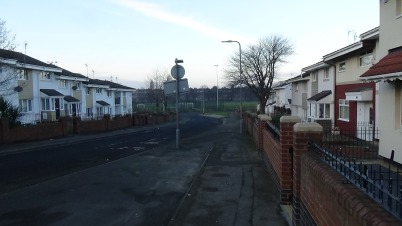 I head up Cowper Road, this links to Kingston Road, so it means I’ll have taken a loop around the neighbourhood. In the 40 minutes I spend knocking all the way up one side, there’s not a single answer. Then, at the last door, a young lad who’s about 15 sticks his head out of a window above me.
I head up Cowper Road, this links to Kingston Road, so it means I’ll have taken a loop around the neighbourhood. In the 40 minutes I spend knocking all the way up one side, there’s not a single answer. Then, at the last door, a young lad who’s about 15 sticks his head out of a window above me.
“I’m doing an art project, have you got a minute.” He comes downstairs and I start the poem.
“Sorry,” he says, stopping me near the end. “I don’t like poetry and I don’t think I ever will.” He closes the door.
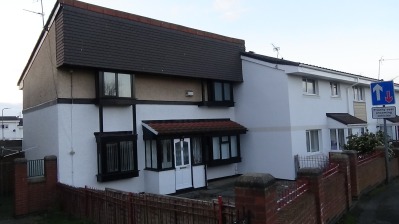 I cross the road and try the other side. I knock on a house that doesn’t look like any of the others; it’s like a mock-Tudor building, with stained glass windows and fake wooden beams. Surely, this is a household that wants some art? A woman answers, I do the poem. She stops me halfway through.
I cross the road and try the other side. I knock on a house that doesn’t look like any of the others; it’s like a mock-Tudor building, with stained glass windows and fake wooden beams. Surely, this is a household that wants some art? A woman answers, I do the poem. She stops me halfway through.
“If you gave me a poem, I’d just tear it up,” she says. I struggle to think of a comeback.
“What if it was about something really important to you?”
“I just rent this house,” she says. “It’s not mine.”
“That’s OK.”
“I don’t buy things from people going door-to-door.”
“I’m not going to charge anything.” She pauses… It looks as though she might be about to say yes.
“Look. I just don’t like poetry, OK?”
I can’t help but laugh, she tried everything to get out of it. But it’s a harsh blow all the same. This is 2 people in the space of as many minutes who’ve really not liked my poem. Surprisingly, this has never happened to me yet either. I try the rest of the street and there’s nobody, just a Huskie with one blue eye and one brown, manically barking at me through a fence. I hear a woman trying to temp him away from me with the promise of a sausage.
“Come and get your sausage then,” I hear her call. But he doesn’t want a sausage. He wants to bark at the failing poet.
 I try one last street, Melville Walk, just above Kingston Road. It’s the same story. A few people answer, no one wants to get involved. It’s getting dark now, I’m running out of time and ideas. Cold and tired, I’m about ready to admit defeat. As I’m making a dictaphone recording, the shadow of a group of teenagers moves past me.
I try one last street, Melville Walk, just above Kingston Road. It’s the same story. A few people answer, no one wants to get involved. It’s getting dark now, I’m running out of time and ideas. Cold and tired, I’m about ready to admit defeat. As I’m making a dictaphone recording, the shadow of a group of teenagers moves past me.
“Are you lost?” one asks.
“No,” I say. “I don’t suppose you can think of anyone who wants a poem though, can you?” A boy comes over to me. Under the orange streetlight, I see that it’s Julie’s son, Cameron.
“Not really.” I explain the bad luck I’ve had, I mention what Chelsea said, about people not answering. “I did think you were the press,” he says, nodding.
I look at my watch. It’s time to go. I take my hat off to you Kingston Road, you’ve beat me. But I don’t feel sad. Today I think I’ve learned first-hand what the residents of Kingston Road actually stood to gain from going on national television. Frustration about the state of their houses, as well as the personal turmoil that people like Julie were going through while being accused of ‘scrounging’, seems to have reached breaking point. Feeling like they were being ignored by the council and scapegoated in the news, the residents took part in a very surreal and 21st century phenomenon; they bypassed the government and broadcast their complaints nationwide, forcing the powers that be to either listen to their demands or risk a scandal.
Although it’s incredibly sad that it had to come to that, I can empathise. Who’s to say I wouldn’t have done the same in their position? And it looks as though people like Julie have actually managed to make this work for them; she’s navigated the cut-throat world of the media and connected straight with the general public to do something positive. The slogan for her charity is ‘All You Need is Love’, which seems particularly apt, referencing as it does another working class person who used their fame to try and make the world a better place.
But, as I walk back down Norton Road, I can’t help but get the feeling that it’s all come at a price as well. I wonder how much the media coverage of Kingston Road has made people more suspicious of strangers here? How many residents didn’t want to answer their door to me, for fear some slimy creep from The Sun was waiting on the other side, ready to take the smallest thing they said out of context and plaster it all over tomorrow’s front page? I find the thought of this a little tragic. But I can’t be sure it wasn’t all to do with me, either. After all, 2 people took the time to listen to my poem and they didn’t like it. I have to face the possibility that the project might just not work in Stockton. And if it won’t work in Stockton, where else might it not work? I need to know for sure. And I can think of one way to find out…
–
* I’m a Door-to-Door Poet
and my hair could be much neater.
But this could be worse,
I could be here to check the meter.
I won’t be going through your cupboards
trying to take a reading,
I just want to ask a question
that I hope you’ll find intriguing.
In school they taught me poetry’s bust,
wrote by toffs who’ve turned to dust
on country manors, deathly shrouds,
serious Lords and fluffy clouds.
I found it quite hard to relate.
I grew up on a rough estate,
walls thin as paper used to trace,
the clouds an endless shade of grey.
I’m here to make poetry exciting;
like bungee jumping but less frightening.
So I’m at your door to find
the subjects that flow through your mind.
Tell me about your life.
OK, maybe not the whole of it.
I’ll stick it in a poem or at least
have a decent go at it.
Maybe you heard a great story
you’d love to hear in rhyme.
Maybe your blood is boiling
from a recent council fine.
Maybe you dropped your iPhone 6
and it fell down the toilet.
I don’t know, I can’t decide
for you cos that would spoil it.
So cheers for listening to these verses,
I hope I got across my purpose.
Don’t slam the door, don’t be nervous,
the Door-to-Door Poet is at your service.
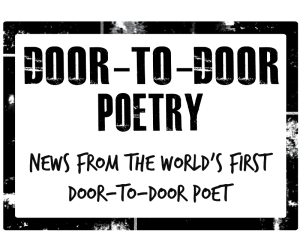
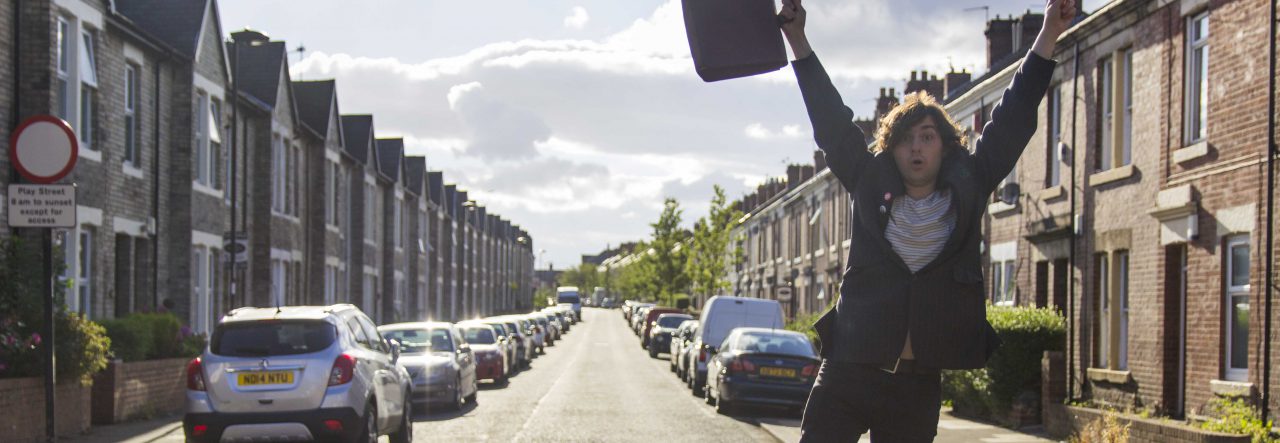
Really interesting post Rowan – keep up the good work – I love you reading your blog and poems – Geoff from Whitley Bay
LikeLike
Was Lovely To Meet You Rowan, Good Luck For The Future. One Tip!!!!😊 Leave Your Brief Case At Home Next Time. Loved Reading Your Blog.
Julie.X
LikeLike
Great meeting you too Julie 🙂 Funny you mention the briefcase actually… It features a lot in part 2 ha ha
LikeLike
Great poem Rowan! Well done too, don’t feel defeated, it takes a lot of courage to go door to door speaking to strangers, no matter what your intentions are!
LikeLike
Cheers! I definitely don’t feel defeated, keep an eye out for part 2… I’m not saying anything else.
LikeLike
Pingback: Benefits Street- Part 2 – Door-to-Door Poetry
I loved your poem! Just caught the end of the BBC news item this morning. Would love to have a poem for my Mum & Dad, retired English teachers and big poetry fans. I bet they were smiling when they watched this morning. More power to you for trying to keep poetry relevant. I think it has a lot to offer! Chin up. Try Glasgow soon 🙂
LikeLiked by 1 person
Pingback: Right Place, Wrong Time – Door-to-Door Poetry
Love that you went door to door offering people poems . What an inspired idea.
And I love the poem that you introduce yourself with .Great stuff…
gramswisewords.blogspot.com
LikeLike